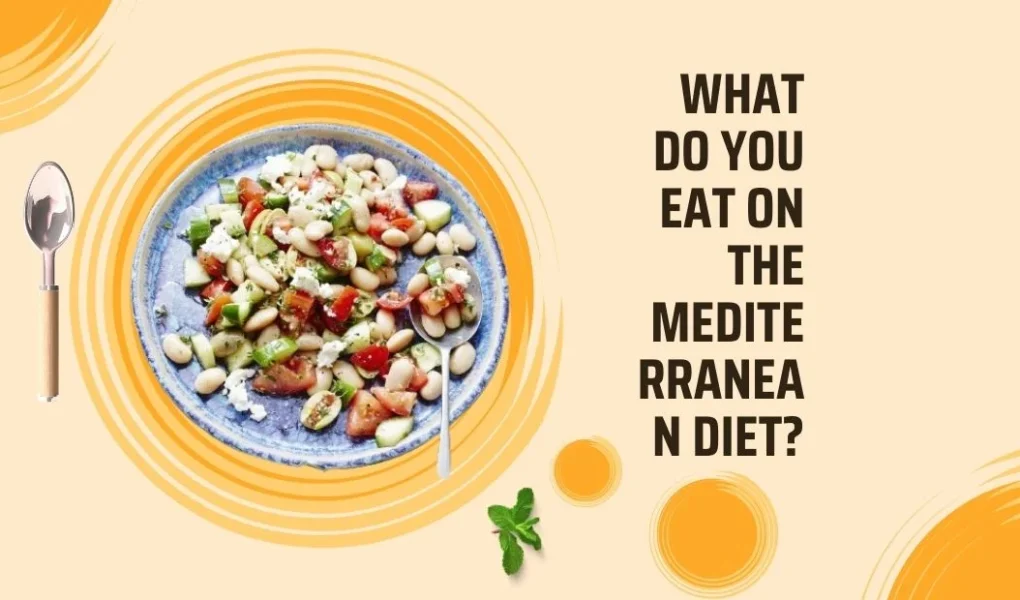The Mediterranean diet is more than just a way of eating; it’s a lifestyle celebrated for its heart-healthy benefits and delicious flavors. Originating from the countries bordering the Mediterranean Sea, this diet emphasizes fresh, minimally processed foods that promote overall health and well-being.

Ingredients
The key ingredients of the Mediterranean diet include:
- Fruits and Vegetables: Enjoy a variety of colorful fruits and vegetables daily, aiming for at least 2-3 servings of each per day. Fresh is best, but frozen options are equally nutritious.
- Whole Grains: Switch to whole-grain options like whole-grain bread, brown rice, and wholegrain pasta. These provide fiber and essential nutrients.
- Healthy Fats: Use olive oil and canola oil instead of butter for cooking and flavoring dishes. These oils are rich in monounsaturated and polyunsaturated fats, which support heart health.
- Fish and Poultry: Opt for fish, such as salmon, sardines, trout, mackerel, and herring, at least twice a week. These oily fish varieties are high in omega-3 fatty acids, beneficial for heart health. Poultry like chicken and turkey are also good protein sources.
- Nuts and Seeds: Enjoy a handful of unsalted nuts per day as a healthy snack. Nuts provide good fats and essential nutrients, but moderation is key due to their calorie density.
- Herbs and Spices: Flavor your meals with herbs and spices like basil, oregano, garlic, and cumin instead of salt. This adds depth to dishes without excess sodium.
- Moderate Alcohol: If you choose to drink alcohol, limit it to moderate levels—no more than 10 standard drinks per week. One standard drink equals 100ml wine, half a pint of beer, or 35ml spirits.
Step-By-Step Instructions
- Increase Fruit and Veg Intake: Incorporate fruits and vegetables into every meal. Choose a variety of types and colors for maximum nutritional benefits.
- Switch to Whole Grains: Gradually replace refined grains with whole-grain alternatives like whole-grain bread, brown rice, and wholegrain pasta.
- Snack on Nuts: Enjoy a handful of unsalted nuts, such as almonds or walnuts, as a nutritious snack. Avoid overly processed or salted varieties.
- Choose Healthy Fats: Use olive oil or canola oil for cooking and as a dressing for salads. These oils are heart-healthy alternatives to butter and margarine.
- Flavor with Herbs and Spices: Enhance the taste of your meals with herbs and spices instead of salt.Try out various combinations to discover your preferred flavors.
- Incorporate Fish and Poultry: Include fish in your diet at least twice a week. Grill or bake fish like salmon for a delicious and healthy main dish.
- Limit Red Meat: Reduce consumption of red meat to no more than three servings per week. Choose lean cuts and smaller portions.
- Drink alcohol moderately if you choose to indulge.
- Limit intake to no more than 10 standard drinks per week, and avoid excessive consumption in one sitting.
Directions
- Fruit and Veg: Enjoy fresh fruits and vegetables as snacks or alongside meals. Try adding berries to breakfast or a salad with lunch.
- Whole Grains: Substitute whole grains for refined grains. Use whole-grain bread for sandwiches and brown rice for side dishes.
- Nuts and Seeds: Snack on a small handful of nuts, such as almonds or walnuts, for a healthy boost of protein and good fats.
- Healthy Fats: Use olive oil or canola oil for cooking and salad dressings. These oils are abundant in monounsaturated fats, which promote heart health.
- Herbs and Spices: Flavor dishes with herbs like basil and spices like cumin or garlic instead of salt. This enhances taste without adding sodium.
- Fish and Poultry: Incorporate fish into your diet at least twice a week. Choose fatty fish like salmon or trout for omega-3 benefits.
- Limit Red Meat: Cut down on red meat consumption. Opt for lean cuts and smaller portions when you do include it in your meals.
- Moderate Alcohol: If you drink alcohol, limit intake to moderate levels. Stick to no more than 10 standard drinks per week, and avoid binge drinking.
Nutrition Facts
The Mediterranean diet is rich in:
- Fiber: Found in fruits, vegetables, and whole grains, fiber supports digestive health and helps control cholesterol levels.
- Healthy Fats: Monounsaturated and polyunsaturated fats from olive oil, nuts, and fish support heart health and reduce inflammation.
- Antioxidants: Abundant in fruits, vegetables, and herbs, antioxidants help protect cells from damage caused by free radicals.
- Omega-3 Fatty Acids: Found in oily fish like salmon, omega-3s are crucial for brain function and heart health.
Reviews
Users of the Mediterranean diet report:
- Improved heart health and cholesterol levels.
- More energy and better overall well-being.
- Enjoyment of flavorful and satisfying meals.
- Sustainable weight management.

Community Tips and Praise
- “Switching to olive oil has been a game-changer for my cooking!”
- “I love how I can snack on nuts and feel full without guilt.”
- “Adding more fish to my diet has made me feel healthier and more energetic.”
- “Using herbs and spices instead of salt has really enhanced the flavors of my meals.”
In conclusion, the Mediterranean diet offers a flavorful and nutritious way of eating that supports heart health, overall well-being, and sustainable weight management. By focusing on fresh, minimally processed foods and incorporating key ingredients like fruits, vegetables, whole grains, healthy fats, and lean proteins, you can enjoy delicious meals while improving your health for the long term. Start your Mediterranean journey today and savor the benefits of this celebrated diet!




